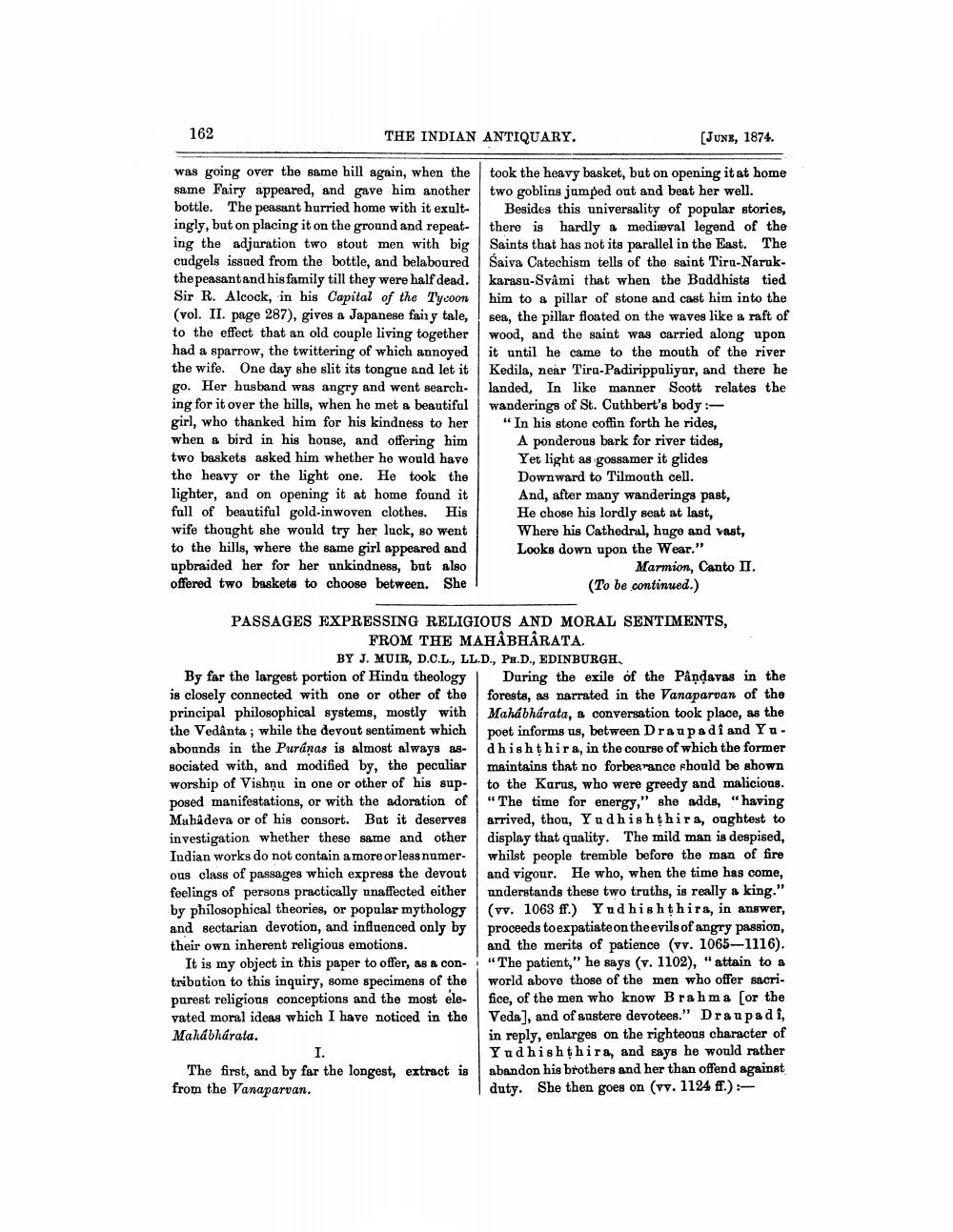________________
162
THE INDIAN ANTIQUARY.
(JUNE, 1874.
was going over the same hill again, when the same Fairy appeared, and gave him another bottle. The peasant hurried home with it exultingly, but on placing it on the ground and repeating the adjaration two stout men with big cudgels issued from the bottle, and belaboured the peasant and his family till they were half dead. Sir R. Alcock, in his Capital of the Tycoon (vol. II. page 287), gives a Japanese fairy tale, to the effect that an old couple living together had a sparrow, the twittering of which annoyed the wife. One day she slit its tongue and let it go. Her husband was angry and went search ing for it over the hills, when he met a beautiful girl, who thanked him for his kindness to her when a bird in his house, and offering him two baskets asked him whether he would have the heavy or the light one. He took the lighter, and on opening it at home found it full of beautiful gold-inwoven clothes. His wife thought she would try her luck, so went to the hills, where the same girl appeared and upbraided her for her unkindness, but also offered two baskets to choose between. She
took the heavy basket, but on opening it at home two goblins jumped out and beat her well.
Besides this universality of popular stories, there is hardly a mediæval legend of the Saints that has not its parallel in the East. The Saiva Catechism tells of the saint Tiru-Narukkarasu-Svâmi that when the Buddhists tied him to a pillar of stone and cast him into the sea, the pillar floated on the waves like a raft of wood, and the saint was carried along upon it until he came to the mouth of the river Kedila, near Tira-Padirippuliyor, and there he landed, In like manner Scott relates the wanderings of St. Cuthbert's body :"In his stone coffin forth he rides,
A ponderous bark for river tides, Yet light as gossamer it glides Downward to Tilmouth cell. And, after many wanderings past, He chose his lordly seat at last, Where his Cathedral, huge and vast, Looks down upon the Wear."
Marmion, Canto II. (To be continued.)
PASSAGES EXPRESSING RELIGIOUS AND MORAL SENTIMENTS,
FROM THE MAHABHARATA.
BY J. MUIR, D.C.L., LL.D., Ph.D., EDINBURGH, By far the largest portion of Hinda theology During the exile of the Påndavas in the is closely connected with one or other of the forests, as narrated in the Vanaparvan of the principal philosophical systems, mostly with Mahabharata, & conversation took place, as the the Vedanta ; while the devout sentiment which poet informs us, between Draupadi and Yuabounds in the Puranas is almost always as- dhishthira, in the course of which the former sociated with, and modified by, the peculiar maintains that no forbearance should be shown worship of Vishnu in one or other of his sup to the Karus, who were greedy and malicious. posed manifestations, or with the adoration of "The time for energy," she adds, "having Mahadeva or of his consort. But it deserves arrived, thou, Yudhishthira, oughtest to investigation whether these same and other display that quality. The mild man is despised, Indian works do not contain a more or less numer- whilst people tremble before the man of fire ous class of passages which express the devout and vigour. He who, when the time has come, feelings of persons practically unaffected either understands these two truths, is really a king." by philosophical theories, or popular mythology (vv. 1063 ff.) Yudhishthira, in answer, and sectarian devotion, and influenced only by proceeds toexpatiate on the evils of angry passion, their own inherent religious emotions.
and the merits of patience (vv. 1065-1116). It is my object in this paper to offer, as a con- "The patient," he says (v. 1102), "attain to a tribution to this inquiry, some specimens of the world above those of the men who offer sacripurest religions conceptions and the most ele- fice, of the men who know Brahma for the vated moral ideas which I have noticed in the Veda], and of austere devotees." Draupadi, Mahábhárata.
in reply, enlarges on the righteons character of
Yudhishthira, and says he would rather The first, and by far the longest, extract is abandon his brothers and her than offend against from the Vanaparvan.
duty. She then goes on (vv. 1124 ff.) :
I.




